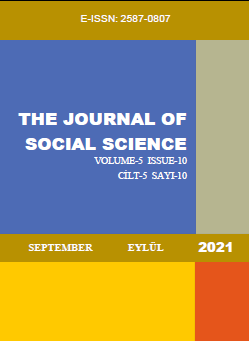İNGİLTERE’Lİ TÜRK-MÜSLÜMAN GENÇLERDE DİNDARLIK VE AHLAKÎ OLGUNLUK
RELIGIOSITY AND MORAL MATURITY IN TURKISH-MUSLIM YOUTH IN THE UK
Author(s): Nurten KimterSubject(s): Ethics / Practical Philosophy, Islam studies, Demography and human biology, Sociology of Religion
Published by: Dicle Üniversitesi, Sivil Havacılık Yüksekokulu
Keywords: Religion; religiosity; moral maturity; socio-demographic factors; Turkish Muslim youth; England;
Summary/Abstract: In the present study, the purpose was to investigate whether there is a relation between the level of religiosity and moral maturity levels of Turkish Muslim youth living in the UK. In this respect, the relation between religiosity and moral maturity was uncovered by evaluating it in a different society and culture. The study population consisted of the students that were attending high school, college, and university in the UK, and the sampling consisted of 475 Turkish-Muslim youth living in the city of London. The study had a correlational and quantitative study design conducted with screening method and questionnaire technique. The “Personal Data Form”, “Religiosity Scale”, and “Moral Maturity Scale” were used as the data collection tools in the study. The SPSS 25 Package Program was used for entering the raw data obtained with the measurement tools in the study and for analyzing them with different statistical techniques. The frequency distribution, arithmetic mean, t-test, correlation, and regression analysis were used to analyze the study data. As a result of the study, it was concluded that there were no significant differences in the moral maturity levels of Turkish Muslim youth living in the UK according to their gender. On the other hand, it was also observed that there were positive and statistically significant relations between the age, education, and family income levels of young people and their moral maturity levels. In the study, it was also detected that Turkish-Muslim youth in the UK had a high level of religiosity and a higher-than-moderate level of moral maturity. Again, it was determined that there was a high and positive correlation between the general religiosity and dimensions of religiosity, subjective religiosity perception and subjective family religiosity, and moral maturity levels of youth in the UK. Finally, it was determined that religious knowledge, worshipping, age, and family income levels significantly predicted the moral maturity levels of Turkish-Muslim youth living in the UK.
Journal: The Journal of Social Science
- Issue Year: 5/2021
- Issue No: 10
- Page Range: 474-499
- Page Count: 26
- Language: Turkish

